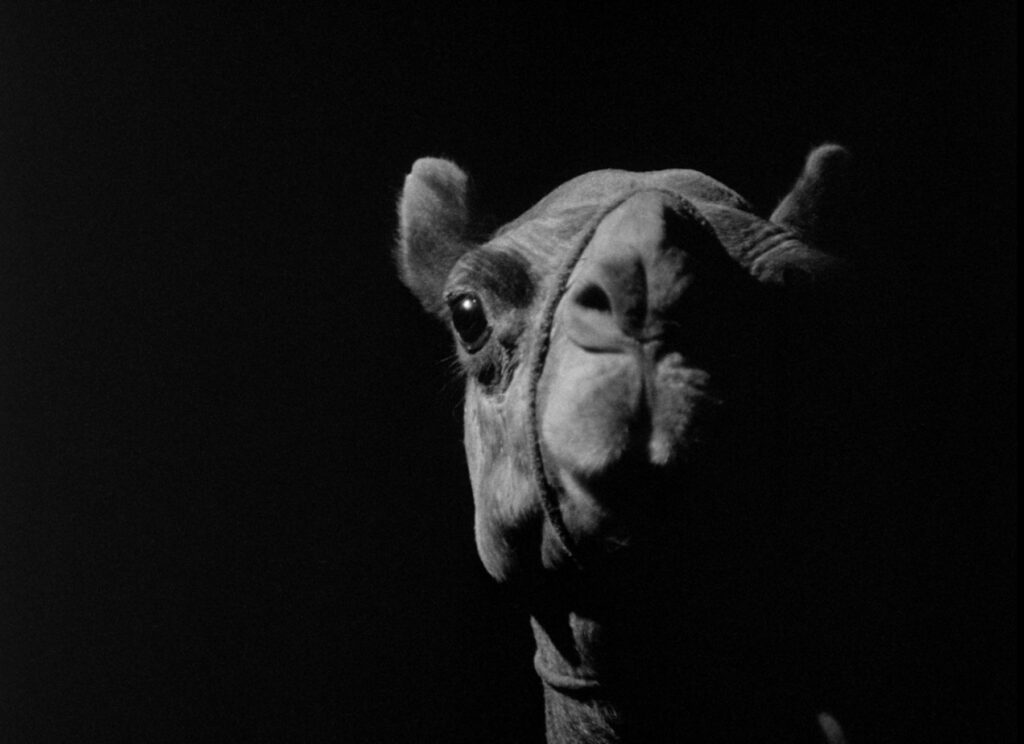Fall invariably brings new energy to the local film programming calendar, and this week provides an apt start to the season, with at least four events and series kicking off. The shortest-term such is the annual Bernal Heights Outdoor Cinema, which primarily takes place Thu/4-Sat/6. On Thu/4, there’s a Film Crawl on Mission amongst four indoor venues, each presented by a different institutional partner, including the SF Dance and Queer film fests. Fri/5 brings Film Crawl On Cortland, another odyssey through different indoor venues featuring a wide variety of shorts. On Sat/6, Under the Stars in Precita Park presents a two-part al fresco bill again encompassing documentary, narrative, animation, experimental, and other genres. Stay tuned for a 22nd season finale evening on a date TBA in October. These are all evening activities that focus on local filmmakers. Check here for a full list of films being shown.

Rapidly approaching its 40th year is Other Cinema, whose founder Craig Baldwin will be launching another fall season this Sat/6 with a combination book launch party and “Archive Fever” show. Among the latter’s “16mm anomalies” will be cinema chestnuts: 1953’s Treasures in a Garbage Can, a UCLA production highlighting how that city’s Department of Sanitation makes sure “nothing is wasted” from your household discards.
Also at Other Cinema is Because We Care, a mid-’70s promo for Oscar Mayer that features umpteen swinging renditions of that “I wish I was an OM wiener” jingle, glimpses of “advanced meat processing” along the “hot dog highway,” and the bewildering message that somehow this company is all about “friendship, harmony, and enthusiasm.” Next week on Sat/13, there’s a bill of experimental films about the animal kingdom; on Sat/20, an evening devoted to “Palestine Action” includes shorts involving Banksy and Roger Waters, plus a screening of last year’s incendiary Oscar-winning documentary feature No Other Land, which we previously reviewed here. Another thirteen Other Cinema programs run through December 20.
Berkeley’s BAMPFA is also starting its fall season (through November 19) with an emphasis on the experimental in two series that commence this week. One is the latest edition of its very long-running Alternative Visions showcase, which regularly gathers screen missives from the international avant-garde both archival and new. It starts again this Wed/3 with two pioneering French works of celluloid surrealism, Germaine Dulac’s 1928 The Seashell and the Clergyman, and Jean Cocteau’s 1930 The Blood of a Poet. Later on there will be works by Eisenstein, Maya Deren, Sidney Peterson, Kenneth Anger, Marie Menken, Cheryl Dunye, three Japanese experimentalists (Michio Okabe, Mako Idemitsu, Tomonari Nishkawa), an in-person lecture by J. Hoberman, and more.
The same institution hosts The Signature Cinema of Roy Andersson this Sat/6 through October 19, a fairly complete survey of the Scandinavian auteur who has carved out his own utterly unique terrain of deadpan existentialist comedy. The series begins with his 1969 debut A Swedish Love Story, a relatively conventional coming-of-age story that was well-received. But that success threw him into a creative crisis that ultimately led to 1975’s Giliap—an odd mixture of miserabilism and social satire so loathed at the time that Andersson didn’t make another feature for 25 years. But he wasn’t idle: A program of “Short Films & Commercials” on September 28 reveals he was busy working towards his fully evolved style of absurdist face in sickly pastels and stationary-camera tableaux via a series of distinctive TV ads, as well as remarkable quasi-narrative shorts like 1987’s Something Happened (a flummoxing PSA about AIDS) and 1991’s World of Glory.
All laid path to 2000’s multinational whatsit Songs From the Second Floor (playing Sat/20), a mix of Tati, Eraserhead, and god knows what else that was stupefying and stupendous. (Wes Anderson fans may find his aesthetic not-unfamiliar.) Possibly even better was You, the Living seven years later. It’s hard to describe Andersson’s films—you just have to see them. Initially alienating, then hilarious and dazzling, they aren’t really like anyone else’s work. Though they certainly are like one another, which is probably why his later features A Pigeon Sat On A Branch Reflecting On Existence and About Endlessness struck me as examples of a very good thing that has started to repeat itself. But if those constitute your introduction to this director, they’ll doubtless impress anyway.
Three newly arriving narrative features range from the mostly-comedic to the very serious, but all in one way or another pivot around issues of grief. The best of them is Twinless from writer/director/star James Sweeney, whose 2019 Straight Up we reviewed here. This is another odd-couple cringe comedy, with Sweeney himself playing a similarly off-putting character. Before, he was a possibly-asexual man who found his (still platonic) potential soulmate in a straight actress (Kate Findlay) whose alienatingly snarky personality echoed his own. Here, he’s Dennis, another somewhat exasperating loner who bonds with Roman (Dylan O’Brien) at a support group for people who’ve lost their twin sibling. They are opposites in most ways, particularly as Roman is a surly jock who’s a bit of a defensive dim bulb, whereas acerbic Dennis looks like he hasn’t risked athletics since third grade dodgeball. But they find unlikely companionship in each other, which is nice.
Or is it? At around the 20-minute mark, the opening title finally arrives, and after that we flash back to prior events—only to discover that Dennis isn’t really who/what he presents to Roman at all. There’s all kinds of “creepy stalker” vibe around the truth of the matter, a tension that only grows more acute once a coworker he disdains, Marcie (Aisling Franciosi), meets hunky Roman and they quickly become a couple. Needless to say, Dennis does not handle other people’s happiness well.
Twinless doesn’t end up being as satisfying as Straight Up was, though it similarly manages to get us involved and empathetic towards some personalities we’d probably run screaming from in real life. O’Brien (who also plays the very, very different late twin) is really good as a frustrated dumb person who’s spent his whole life being overshadowed by a smart, confident, adventurous sibling. Sweeney is an astute writer and director, though not since Mike White and Chuck & Buck has there been one of those who infuses a gay/straight relationship dynamic with such predatory, self-loathing ickiness. Twinless opens Thu/4 at the Smith Rafael Film Center in Marin, Fri/5 at the Opera Plaza Cinemas in SF.
Working much harder to ingratiate—way too hard, I’d opine—is Sam Hayes’ debut feature Pools. Kennedy (Odessa A’zion, who bears an odd resemblance to 1970s teen idol Leif Garrett) is a scholarship student at a small university, attending summer classes to make up for having blown it during the prior academic year. It’s understandable that she’s still floundering since her father’s sudden death. But now her grades and attendance have sunk long enough that she’s at risk of being expelled. Rather than knuckling down, she impetuously decides to invite other strays stuck on campus to a “party” that will consist of all-night boozy leapfrogging from one ritzy area home’s underutilized pool to another—an appealing concept because there’s a heatwave going on, and dormitory air conditioners all seem to be on the fritz.
That concept might recall 1968 cult classic The Swimmer, a John Cheever-derived glimpse at the hollowness at the heart of the “American Dream.” But really Hayes is aiming for something more like The Breakfast Club, with a similar upscale-Chicago-suburbia setting, and the same number of principal characters inhabiting similar archetypes: Jock (Mason Gooding), princess (Ariel Winter), dweeb (Tyler Alvarez), low self-esteem girl (Francesca Noel). There’s also a subplot involving a slackerish AC repairman (Michael Vlamis).
Pools has lots of youthful-capering montages, ill-conceived sporadic voiceover narration, wall-to-wall shoehorned soundtrack songs, and effortful visual gimmicks, notably lots of zoom lensing as exclamation marks. These characters don’t deepen much, though we’re meant to think they do, and the resolution is so laughably pat I wondered if even viewers as young as they are would be willing to swallow it. (Spoiler alert: Our heroine realizes dropping out of college is okay because she somehow forgot she’s been a talented singer-songwriter all along.) Hayes has made the kind of slick, flashy film that instantly qualifies him for bigger-budgeted projects, but despite the decent efforts of the cast, I didn’t find a moment of sincere emotion here. Pools opens at Alamo Drafthouses on Fri/5.
Still, it is likely to please more people than Drowning Dry, a pretentious drama from writer-director Laurynas Bareisa that was Lithuania’s Oscar-submission feature last year. It involves two middle-class families with young children where it turns out the wives are sisters. They go on a collective vacation to a summer house, where a potentially serious accident underlines tensions below the surface. It’s not until the very end that we realize this tale, too, is haunted by loss. But Bareisa dwells on everyday minutae that reveals little about the characters, with major events often happening off-screen, while non-chronological storytelling just further obscures the ultimate point rather than heightening cumulative impact. Some have found Dry’s detachment powerful, but for me its calculated gambits only muffled emotional engagement. It begins streaming on arthouse platform MUBI Fri/5.






